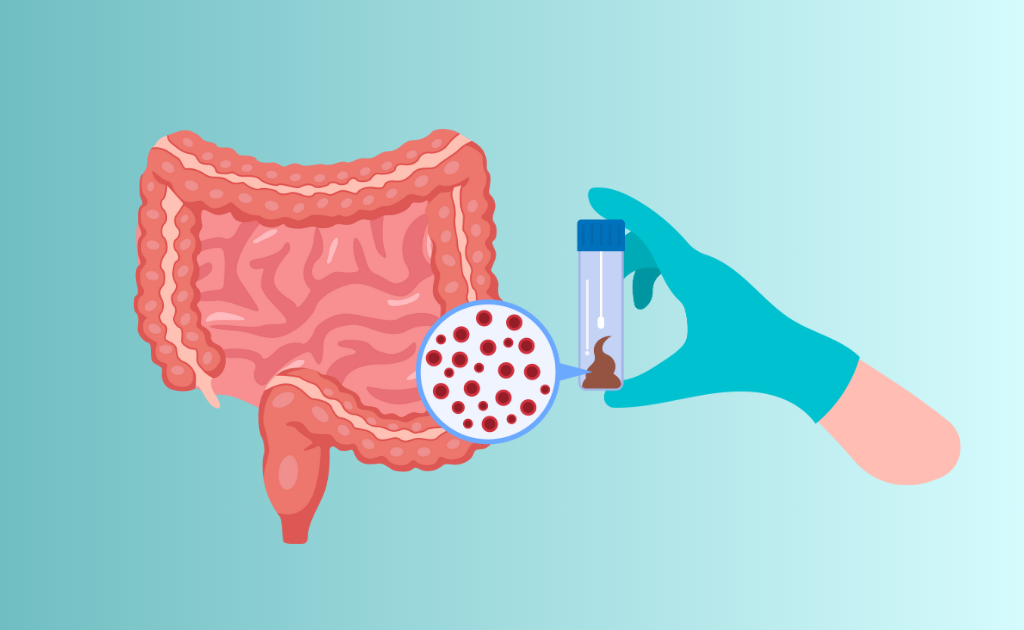
Bowel cancer is cancer that occurs in any part of the large bowel, which includes the colon and rectum. It is the second highest cause of cancer deaths in New Zealand with more than 1,200 people dying from bowel cancer each year. It often has no symptoms or very few symptoms in the early stages, making it important to understand the signs and if you should start screening/testing for it. If bowel cancer is caught early, 90% of bowel cancer cases can be treated successfully.

Bowel cancer also known as colorectal cancer occurs in any part of the large bowel. Depending on where it starts it may also be called cancer of the colon, or cancer of the rectum. The majority (about 9 out of 10) of bowel cancers are adenocarcinomas, which start in the gland lining of the bowel.
Doctors use staging to indicate how far cancer has spread the size of any tumours. Your symptoms will often depend on the stage of the cancer.
Stage 1: Cancer is confined to the inner lining of the bowel.
Stage 2: the cancer has spread to the outer surfaces of the bowel wall.
Stage 3: Cancer has spread to the lymph nodes near the bowel.
Stage 4: Cancer has spread to other parts of the body (e.g., liver or lungs).
In it’s early-stages bowel cancer may have no symptoms or very few symptoms. Symptoms at the early stages may include:
As bowel cancer progresses you are more likely to experience the symptoms listed above. Additionally, some late-stage symptoms you may experience in include:
If you have any of the symptoms listed above (early-stage and late-stage), or you are concerned about bowel cancer, see your GP or a healthcare professional right away.
There are a range of risk factors that increase your risk of bowel cancer. Some of these include:
*While bowel cancer is more common in those older than 50 years, it affects people of all ages. Over 350 people under 50 are diagnosed with bowel cancer each year in New Zealand.
Lifestyle risk factors that should be avoided include:
If you have any of the symptoms of bowel cancer (early-stage and late-stage), or you are concerned about bowel cancer, your GP can make an accurate diagnosis.
Bowel cancer can be identified after a screening test. If you have symptoms, your healthcare provider will usually recommend a colonoscopy to check for bowel cancer.
If bowel cancer is diagnosed, additional tests may be done to determine what stage the disease is in.
As bowel cancer can be difficult to self-identify, especially in its early stages, it is often caught during routine screening. This routine testing is done with hopes to catch the disease early.
The National Bowel Screening Programme is open to New Zealanders eligible for publicly funded health care, depending on their age. It is a free government-run programme offered every two years to people aged 60 to 74. In some areas Māori and Pasifika are invited to participate in bowel screening from 50 years old.
Further Information
Written by Paul Taylor
Paul Taylor is a New Zealand–based healthcare content writer with 5+ years’ experience creating patient friendly articles for online pharmacies and health platforms. He specialises in accessible condition guides, prescription FAQs, OTC advice, and health & wellbeing tips, translating complex medicines or health condition information into clear, actionable content. Paul collaborates with the ZOOM Pharmacy clinical team and bases every article on authoritative sources, peer reviewed journals and national clinical guidelines to ensure evidence based, up to date content. His goal is to help readers feel empowered to make informed decisions about their medicines and wellbeing. This content is general information only and does not replace professional medical advice.